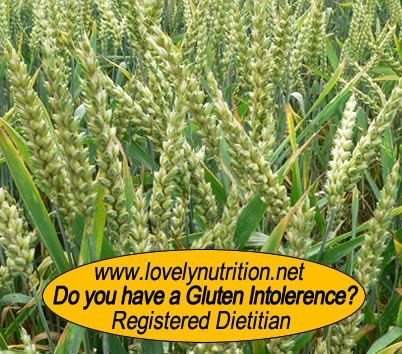Celiac disease, or gluten intolerance/sensitivity is on the rise.
As our genetics haven't changed, Celiac disease is being blamed on the way wheat, the main source of gluten in the American diet, is now grown.
Trying to eat a healthy diet with celiac disease or gluten intolerance can be difficult because many gluten free processed foods have nutrient deficiencies. Many gluten free products are of very poor carbohydrate quality and lack the natural B vitamins. That means that if we are not careful, we can develop micronutrient deficiencies. This means that if we consume a lot of these gluten free substitutes, that our blood sugar levels will rise, which nudges us closer to developing diabetes, and we will likely raise our insulin levels to try to combat the elevated blood sugar levels, which means we will gain weight easier than before.
Some people with celiac disease have obvious symptoms but unfortunately there is not one symptom that offers a red flag of celiac disease. There are many documented symptoms as listed below and can be further researched on websites such as celiac.com and celiac.org.
Not one Symptom defines Celiac Disease because there are many including:
Abdominal cramping/bloating
Constipation
Diarrhea
Energy loss
Anemia
Weight Gain
Joint pain
Osteopenia or osteoporosis
Weakness
Weight Loss
Difficult to concentrate / foggy brain
Current research states that one needs to follow an eating style that they can maintain over a number of years, not a number or weeks or months. Nobody can promise you that you will loose weight and keep it off but I can promise you that I am certified by the Academy of Nutrition and Dietetics in Weight Management. I keep up with the scientific research of weight management and I would never instruct you on any program that is considered to be fad in nature and that does not have significant research to back it up to assure your safety. I have been practicing weight management on myself since my late teen years. Having grown up with an overweight mother, who passed away unexpectedly at the age of 59 due in large part to her excess weight, wanting to be able to manage my weight in a healthy manner is the main reason I choose to become a dietitian 25 years ago. While it does get harder as I get older, and especially as I am now working a completely sedentary job, the information I teach regarding diet and exercise is still safe and effective for myself and my patients.
One may think if they suspect a gluten intolerance, or if they have been diagnosed with celiac disease, that they can figure out how to eliminate gluten on their own. Well, I can tell you from personal experience, gluten is in many more products than one would ever imagine. As it turns out, gluten is very glue like, which makes it a great additive to so many processed foods to get the texture the manufacture desires.
If you have been diagnosed with celiac disease, or are sensitive to gluten and have had to remove it from your diet, please consider working with me to ensure that you won't develop any micronutrient deficiencies and that you won't accidently increase your blood sugar levels or your weight in the process of going gluten free.
Copyright©2016 Healthy Nutrition Solutions / www.healthynutritiontx.com

